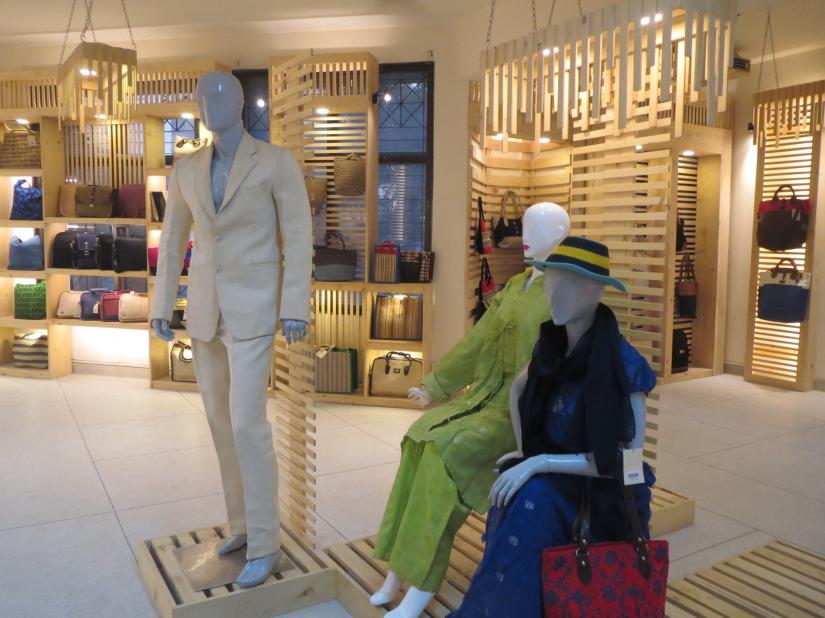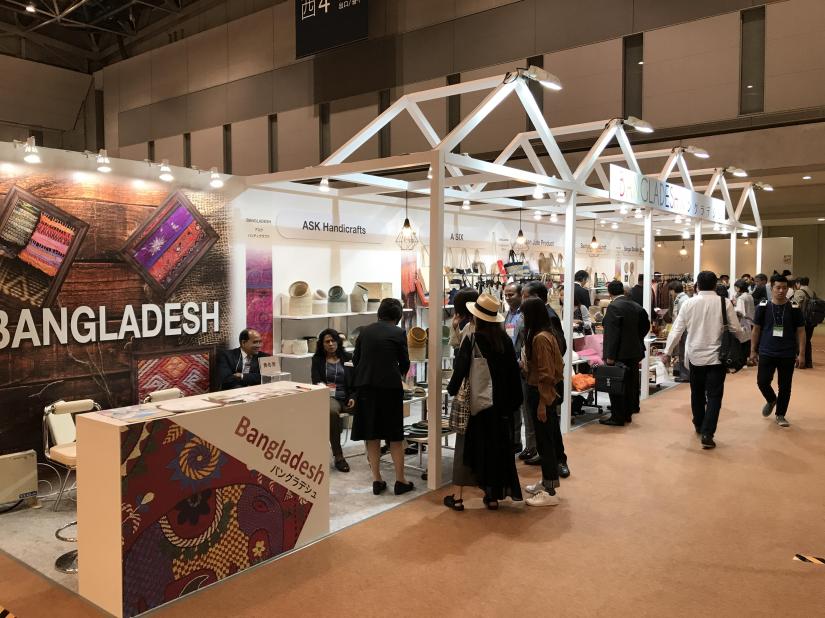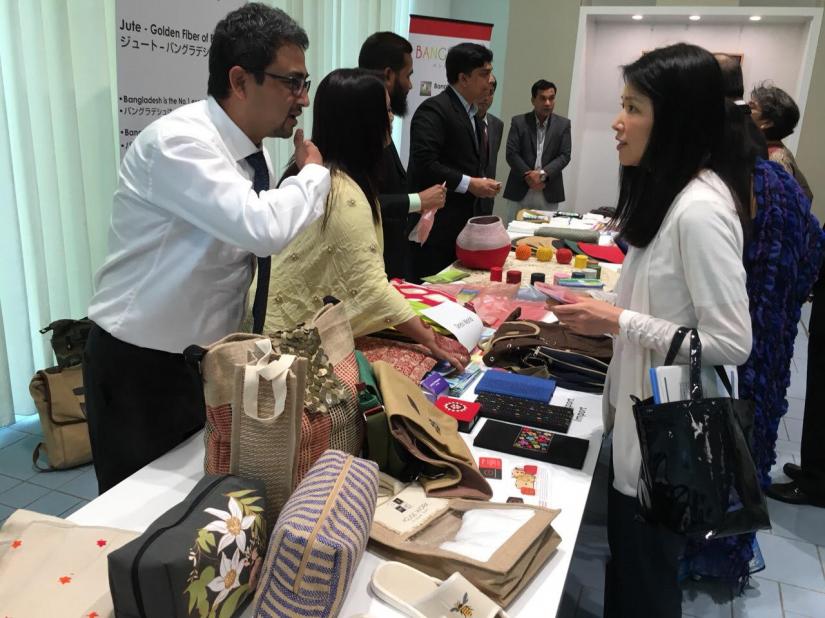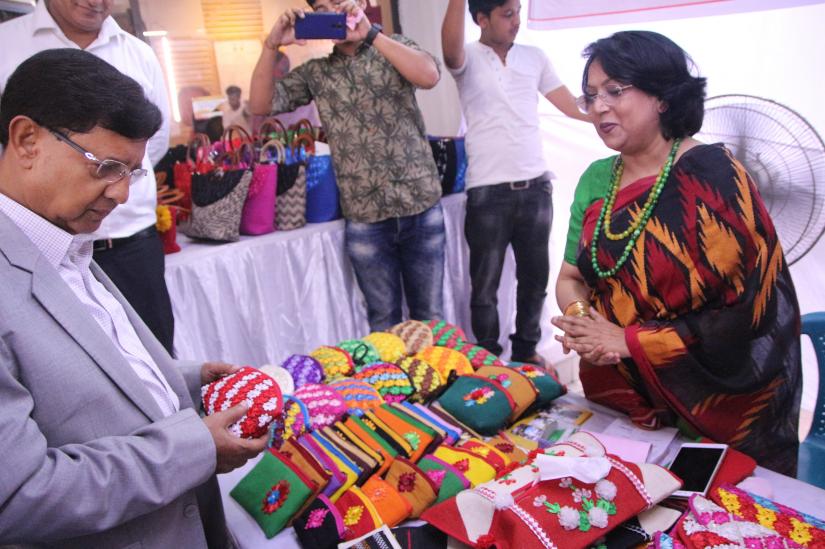 The export of jute and jute-made goods witnessed a healthy growth of 21.55 percent in the first half of the current fiscal year fetching $511.73 million, higher than the target of $400 million.
The export of jute and jute-made goods witnessed a healthy growth of 21.55 percent in the first half of the current fiscal year fetching $511.73 million, higher than the target of $400 million.
The export earnings from jute and jute-made goods during the same period of the previous fiscal were $421.02 million, BSS reports citing latest stats of the Export Promotion Bureau (EPB).
The EPB figures say, export of raw jute during this first half of FY20 stood at $88.62 million followed by jute yarn and twine $314.68 million, jute sacks and bags $58.77 million, man-made filaments and staple fibers $61.13 million and others $49.66 million.
The export target of jute and jute-made goods in the current fiscal year has been set at $824 million. Textiles and Jute Secretary Lokman Hossain Mia told BSS that the demand of jute-made products is growing in Europe and other Western countries due to awareness of using natural fiber.
Textiles and Jute Secretary Lokman Hossain Mia told BSS that the demand of jute-made products is growing in Europe and other Western countries due to awareness of using natural fiber.
“Considering this demand, Bangladesh is producing newer jute products with different dimensions side by side steps have been taken to make effective branding of local jute products in international market. For this, the export and jute-made goods is gradually increasing,” he added.
In a bid to ensure product diversification, state-owned mills have been equipped with modern machineries while the private sector is provided with cash incentives as well as policy support, Secretary Mia told the state news agency.  There are some 22 state-owned jute mills and some 200 factories operated by the private sector across the country.
There are some 22 state-owned jute mills and some 200 factories operated by the private sector across the country.
Private sector entrepreneurs echoed the ministry on increased global demand but said the price is not going up.
“Multiple products are being produced in the jute sector through research and those are exported abroad. But, the price of jute-made goods is not increasing in the international market although the production cost has risen,” Creation Pvt Ltd Managing Director M Rashidul Karim Munna told BSS. A scope of boosting huge local and international market of jute-made goods has been created considering the growing demand as well as widespread use of shopping and food-grade bags, composite, geo-textile, pulp and paper, according to him.
A scope of boosting huge local and international market of jute-made goods has been created considering the growing demand as well as widespread use of shopping and food-grade bags, composite, geo-textile, pulp and paper, according to him.
According to EPB, Bangladesh is now exporting jute and jute-made goods to a number of countries like Afghanistan, Algeria, Austria, Belgium, Benin, Brazil, Bulgaria, Canada, Chili, China, Congo, Costa Rica, Egypt, Italy, Indonesia, Ethiopia, Gambia, Germany, Haiti, India, Ireland, Iran, Japan, Jordan, Korea, Libya, Malaysia, Mexico, Morocco, Myanmar, the Netherlands, Pakistan, Poland, Portugal, Romania, Russia, Saudi Arabia, Sudan South Africa, Taiwan, Tajikistan, Thailand, Turkey, the USA, the UK, Uganda, Uzbekistan, and Vietnam.
 Business
Business
41320 hour(s) 5 minute(s) ago ;
Morning 10:59 ; Friday ; Jul 04, 2025
Jute exports rise by over 21 percent
Send
Bangla Tribune Desk
Published : 04:00, Jan 12, 2020 | Updated : 04:00, Jan 12, 2020
Published : 04:00, Jan 12, 2020 | Updated : 04:00, Jan 12, 2020
0 ...0 ...
/zmi/
Topics: Top Stories
- KOICA donates medical supplies to BSMMU
- 5 more flights to take back British nationals to London
- Covid19: Rajarbagh, Mohammadpur worst affected
- Momen joins UN solidarity song over COVID-19 combat
- Covid-19: OIC to hold special meeting
- WFP begins food distribution in Cox’s Bazar
- WFP begins food distribution in Cox’s Bazar
- 290 return home to Australia
- Third charter flight for US citizens to return home
- Dhaka proposes to postpone D8 Summit
Unauthorized use of news, image, information, etc published by Bangla Tribune is punishable by copyright law. Appropriate legal steps will be taken by the management against any person or body that infringes those laws.
Bangla Tribune is one of the most revered online newspapers in Bangladesh, due to its reputation of neutral coverage and incisive analysis.
F R Tower, 8/C Panthapath, Shukrabad, Dhaka-1207 | Phone: 58151324; 58151326, Fax: 58151329 | Mob: 01730794527, 01730794528






